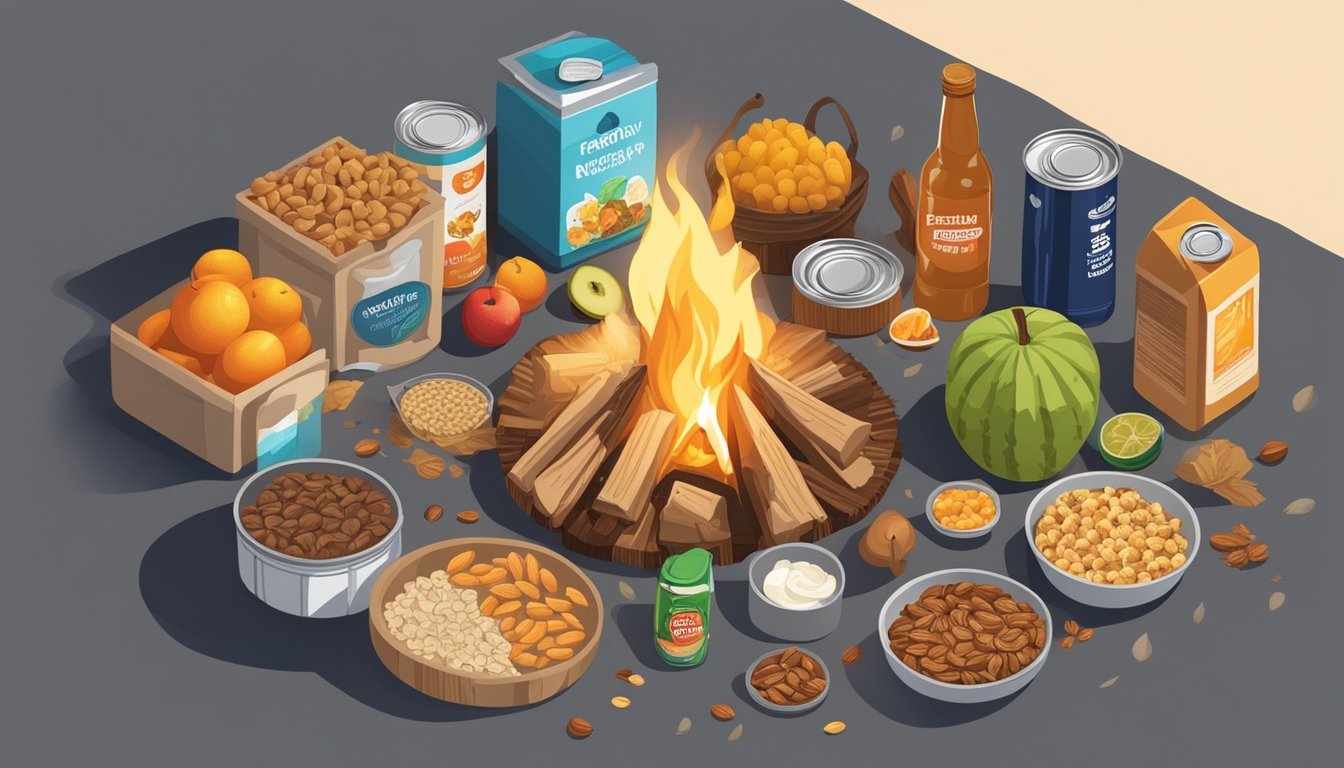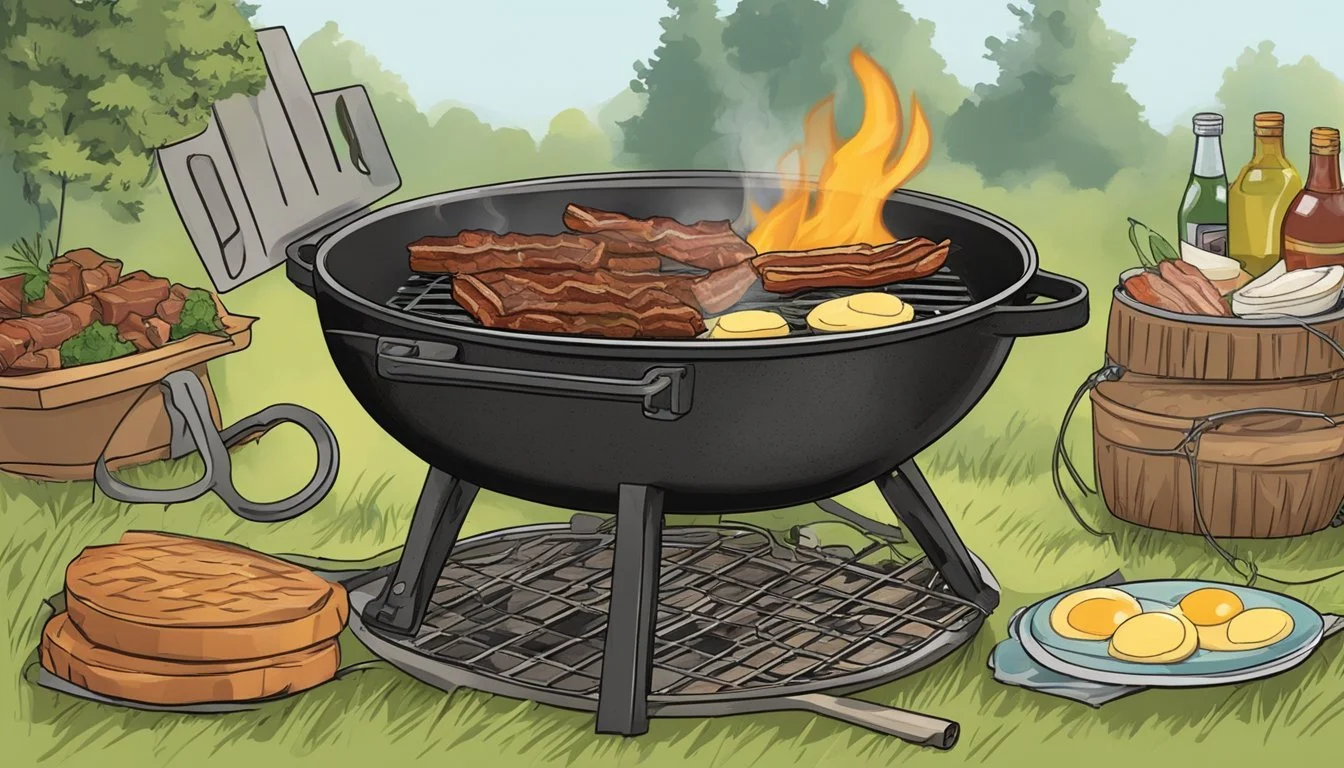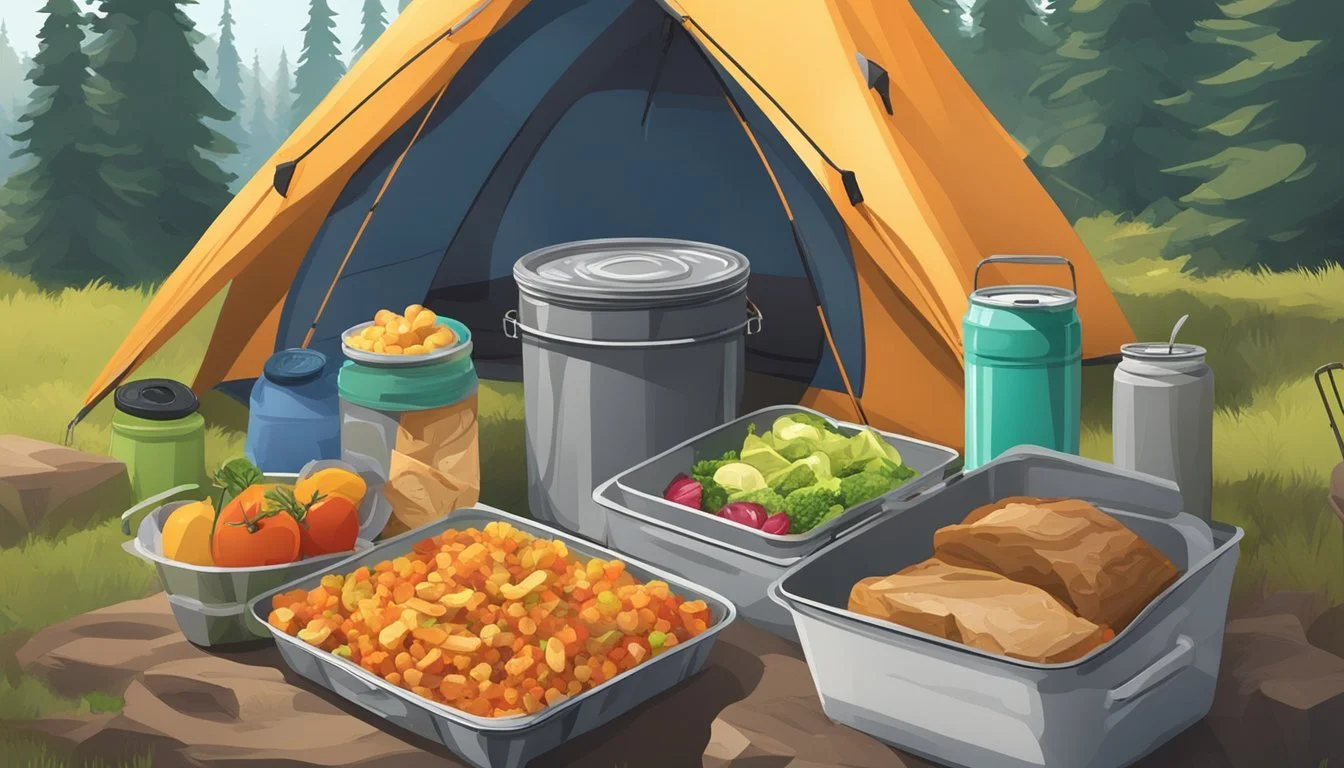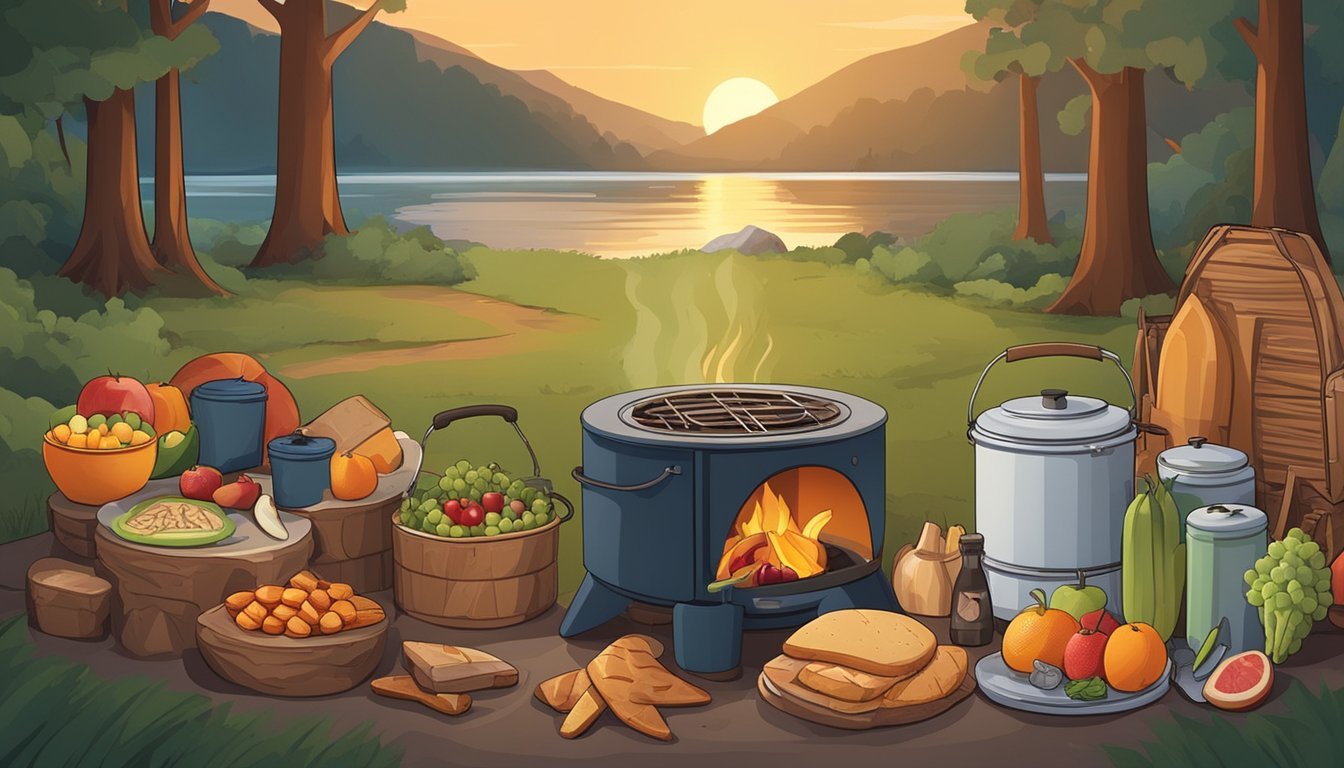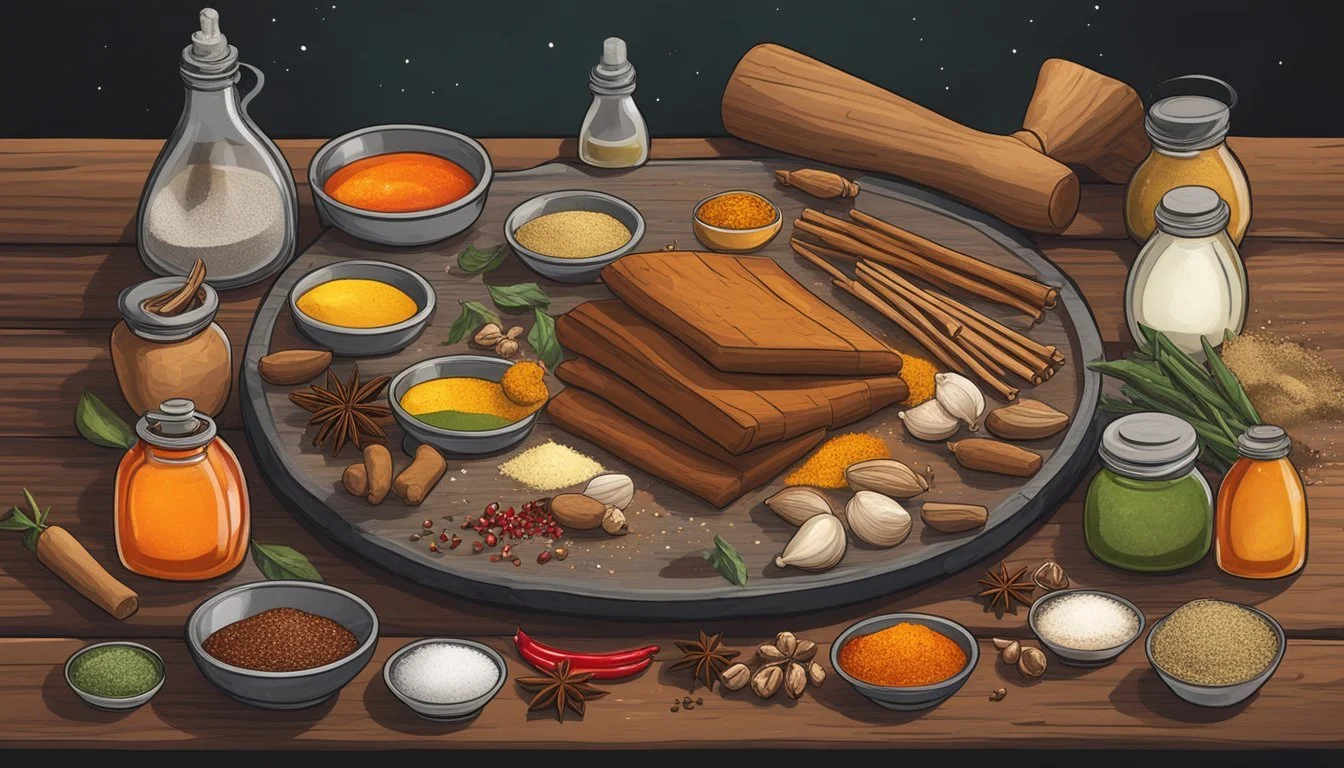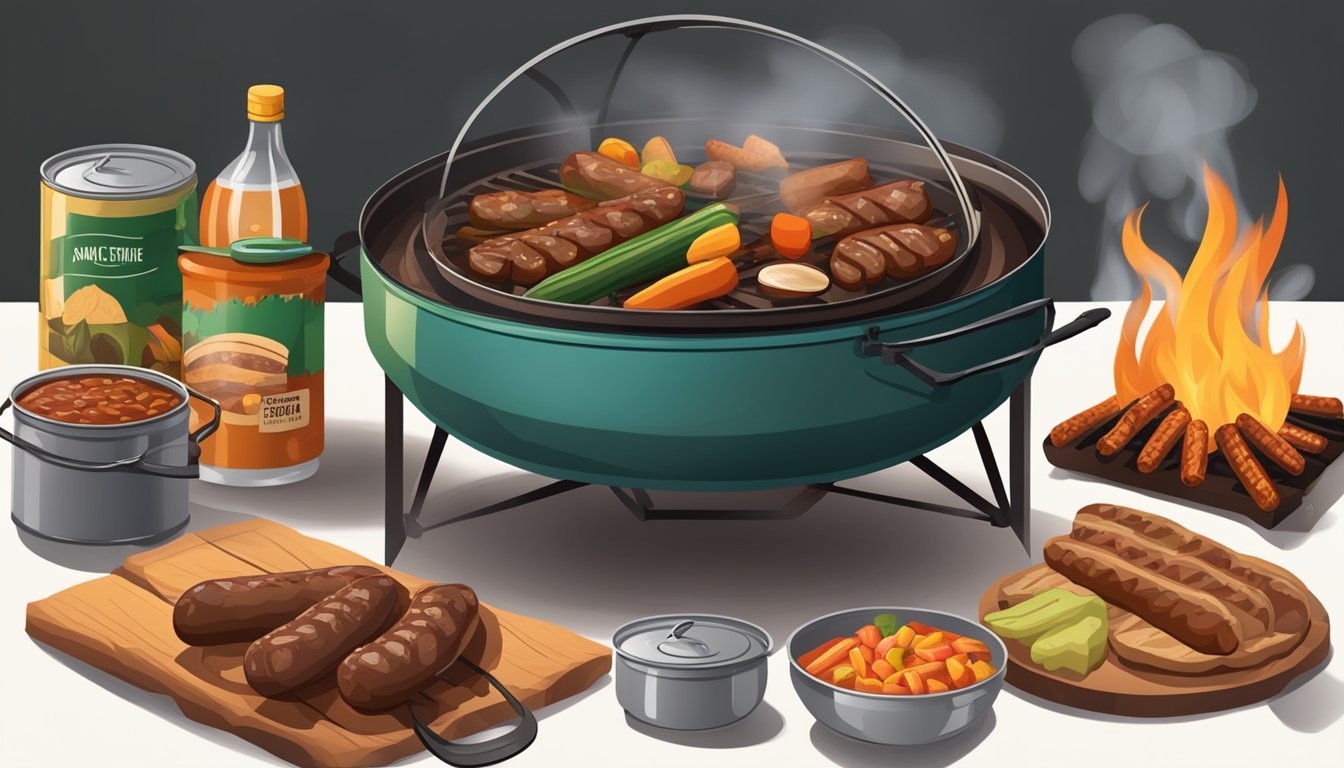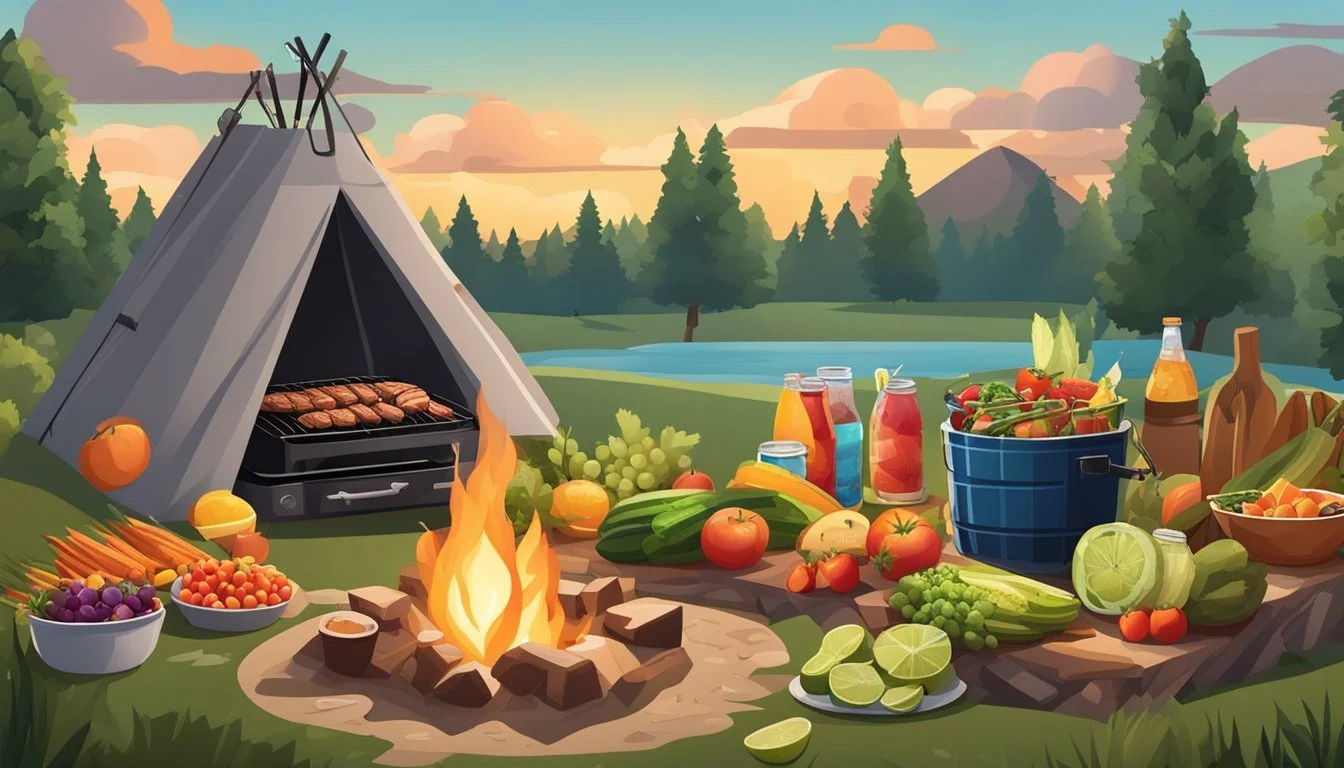Best Foods for a Weekend Camping Trip
Nutritious & Convenient Options
Selecting the best foods for a weekend camping trip is essential for both enjoyment and practicality. When heading into the outdoors, campers should consider simple, easy-to-prepare foods that are also delicious. Practical food choices ensure energy levels remain high for all the adventures a camping weekend holds. Whether the trip is full of hiking, swimming, or simply relaxing by the campfire, the chosen menu can greatly enhance the camping experience.
The ideal camping food list balances nutrition with convenience, opting for items that are non-perishable and easy to transport. A focus on foods that require minimal preparation—like sandwiches (What wine goes well with sandwiches?), pre-cut fruits and vegetables, and ready-to-eat snacks (What wine goes well with snacks?)—can save time and energy. On the other hand, for those looking to cook over an open fire or camping stove, options like bacon and egg tacos appeal to the desire for a warm, hearty meal to start the day. The versatility of ingredients used in meals can offer both variety and efficiency, contributing to satisfying and fuss-free dining under the stars.
Planning meals that cater to the expected weather conditions and preserve well in a cooler or at camp is also a consideration for a weekend excursion. Meals that do not spoil quickly, such as hard cheeses, cured meats (What wine goes well with cured meats?), and canned goods, are reliable staples. For cooler evenings, campers might enjoy hot meals that provide comfort and warmth, while hotter days call for refreshing snacks like fresh fruit or cold salads. By thoughtfully selecting foods, campers can ensure their weekend getaway is as delightful as the natural surroundings they’ve come to enjoy.
Essential Camping Food Packing Tips
When preparing for a weekend camping trip, ensuring food stays fresh and organizing your supplies properly is crucial for a hassle-free experience. Using the right cooler and packaging strategies helps one maintain the quality and safety of their meals.
Choosing the Right Cooler
When selecting a cooler for a camping trip, one must consider the duration of their trip and the type of perishables they’ll be bringing. For a weekend getaway, it is typically sufficient to use a high-quality, insulated cooler that can maintain a low temperature for an extended period. To enhance efficiency, pre-chill the cooler with ice packs a day before packing it, and arrange food items that require the coldest temperatures, like meat and dairy products, closest to the ice.
Key features to look for in a cooler:
Insulation Rating: Opt for coolers with higher insulation ratings for longer ice retention.
Size: Ensure the cooler is spacious enough to store all perishable goods without overcrowding.
Durability: A sturdy, rugged cooler is essential to withstand the outdoor elements.
Packaging and Storage Solutions
Proper food packaging is vital for keeping camping meals organized and preserving their freshness. Before the trip, repackage food items into sealable bags or airtight containers to save space and keep food protected from air and moisture. Utilize a cutting board as a clean surface for food preparation, and remember to pack all necessary utensils such as knives, spoons, and spatulas.
Packaging tips:
Use resealable bags to marinate meats and store cut vegetables.
Implement portion control packs for items like spices and condiments, reducing weight and waste.
Label all packages for easy identification and to efficiently follow the camping menu plan.
By incorporating these strategies, campers can ensure their food remains fresh and delicious throughout their adventure.
Cooking Techniques for Camping
Adapting to outdoor cooking requires mastering a few key techniques. Whether one is searing meat over a grill, simmering stew in a Dutch oven, or roasting marshmallows by a campfire, each approach has its own set of tools and methods for achieving delicious results.
Mastering the Grill
Using a grill is one of the most versatile cooking techniques for campers. Campers should bring essential tools like tongs and a chef's knife to handle and prep food easily.
Grill Temperature Control: Learn to adjust the heat by spreading coals for a hotter surface or stacking them to a side for indirect heat.
Grill Maintenance: Regularly clean the grill grate to prevent sticking and ensure even cooking.
Campfire Cooking Essentials
A campfire provides a traditional and enjoyable way to prepare meals.
Building a Campfire: Start small, using twigs and gradually add larger pieces of wood. Maintain a moderate flame suitable for cooking.
Cookware for Campfire: Opt for cast iron skillets or grills that can withstand the direct heat.
Safety Tips:
Keep a water source nearby in case the fire needs to be extinguished quickly.
Never leave a campfire unattended.
Dutch Oven Delights
A Dutch oven is a heavy-duty pot perfect for a variety of one-pot camping meals, from stews to bread.
Temperature Management: Control the heat by placing coals under and on top of the Dutch oven. More coals mean more heat.
Cooking Techniques:
Roasting: Place the food inside the oven and cover with the lid to retain heat from all sides.
Braising: Partially submerge the ingredients in a liquid and cook slowly over low heat.
Baking: Ideal for making bread or even desserts like cobblers and cakes.
By focusing on these techniques, campers can ensure their meals are as successful and satisfying as the adventures that accompany them.
Healthy Camping Meals
When planning for a weekend camping trip, it's crucial to pack foods that are not only easy to prepare but also nutritious. The goal is to ensure that campers stay energized and are able to enjoy their outdoor adventures without compromising on their dietary needs.
Fruits and Vegetables
Fresh produce should feature prominently in any camping meal plan due to their nutritional value and ease of preparation. For breakfast or a mid-day snack, fruits like apples, bananas, and oranges are excellent choices as they are both refreshing and don't require refrigeration. Vegetables such as carrots, bell peppers, and cucumbers can be pre-sliced for convenience and snacked on with dips like hummus or packed into sandwiches.
Breakfast: Pre-packaged blueberry-oatmeal cakes can be a great start to the day, combining the wholesomeness of oats with the sweet, antioxidant-rich blueberries.
Dinner (What wine goes well with dinner?): A balanced camping dinner might include a Dutch oven chicken & vegetables meal with a variety of seasonings to enhance flavor without adding excessive sodium.
Nutritious Snacks
Snacks are crucial for maintaining energy levels during hikes or other camping activities. Options like trail mix provide a good balance of nuts, seeds, and dried fruits (What wine goes well with dried fruits?) for a quick energy boost. Preparing homemade granola bars before the trip can ensure that everyone has a healthy snack readily available, and they often contain a mixture of grains, nuts, and a bit of sweetness to satisfy cravings.
For gluten and dairy-free options, incorporating snacks like rice cakes with avocado or nut butter spreads can meet dietary restrictions while still offering essential nutrients.
By prioritizing fruits, vegetables, and wholesome snacks, campers can ensure they have access to healthy food options that support an active lifestyle in the great outdoors.
Classic Camping Recipes
When one goes camping, they often look forward to the filling dinners and sweet treats shared around the campfire. Hearty mains and indulgent desserts embody the classic camping experience, providing both nourishment and comfort.
Satisfying Mains
Hot Dogs: A camping staple, hot dogs can be skewered and easily cooked over an open flame. For a simple yet satisfying meal, one can serve them on buns with a variety of condiments.
Burgers: Thick and juicy burgers are a popular choice, grilled to perfection and often topped with cheese, lettuce, and tomato.
Mac and Cheese: Campfire mac and cheese offers a creamy comfort food that both kids and adults enjoy. Versatile in preparation, it can be cooked in a pot over the fire or in a Dutch oven.
Black Bean Chili: For a vegetarian option, black bean chili brings heartiness to the table with a blend of beans, vegetables, and spices, simmering to perfection over the campfire.
Campfire Chili: A more traditional choice, campfire chili with ground beef provides a filling and protein-packed dish that warms one up on cooler nights.
Delightful Desserts
S'mores: A classic camping dessert, s'mores consist of roasted marshmallows and a piece of chocolate sandwiched between two graham crackers.
Dutch Oven Desserts: Utilizing the Dutch oven, one can create various desserts such as cobblers or cakes, offering a sweet finish to the day.
Convenient Pre-Made Meals
When planning a weekend camping trip, bringing along pre-made meals can significantly reduce meal prep time and ensure convenience. Here are a few options for campers:
Freezer Meals: Prepping meals at home and freezing them is a practical option. Meals like chicken fajitas and beef with broccoli can be prepared, frozen, and then simply defrosted and cooked at the campsite, offering a homemade taste with minimal effort.
Mountain House: This brand is renowned among backpackers for their freeze-dried meals that are not only lightweight but also make meal planning a breeze. With a variety of options to choose from, Mountain House meals require just boiling water and a short wait.
Cooking Kits: Companies offer meal kits specifically designed for camping. These may include pre-measured ingredients and simple instructions, ideal for those looking to blend the experience of cooking with the ease of pre-made meals.
Foil Packet Meals: A campground favorite, foil packets can be prepared before the trip and include combinations like shrimp boil or mixed vegetables. These packets are placed directly on coals or a grill, making them a no-muss, no-fuss option.
Meal Type Preparation Convenience Factor Freezer Meals High Moderate Mountain House Low High Cooking Kits Medium Moderate Foil Packets Medium High
For those spending time in nature, especially in the mountains where every ounce matters, choosing meals that are effortless yet comforting can enhance the camping experience. Preparing ahead with these meal options means more time to enjoy the surroundings and less time cooking.
Detailed Camping Menu Planning
When planning a camping menu, it's crucial to outline each meal with easy-to-prepare and satisfying options. Here's a snapshot of meals that cover all the bases from sunrise to sunset.
Breakfast Options
Pancakes: Utilizing a just-add-water pancake mix saves time without compromising on a hearty breakfast. Campers can enhance their pancakes with berries or chocolate chips for added flavor.
Sausage & Potatoes: For those requiring a more savory start, grilled sausage with potatoes and green beans offers a fulfilling meal to fuel a day of outdoor activities.
Lunch Favorites
Trail-Friendly Biscuits: Quick to pack and ready to eat, biscuits are a versatile addition that can be enjoyed with spreads or as a side to soups.
Creative Sandwiches: With a variety of ingredients on hand from meats to vegetables, sandwiches provide a customizable option to satisfy each camper's preference.
Dinner Specialties
Dutch Oven Delights: A classic camping menu often features meals prepared in a Dutch oven. Campfire s'mores and cookies add a sweet touch to the end of the day.
Chili & Cornbread: For a comforting evening meal, a pot of chili accompanied by cornbread is an enduring favorite, made simple with pre-mixed ingredients.
Each recipe chosen for the camping menu should factor in the availability of cooking equipment and the simplicity of meal preparation. The meal plan caters to a satisfying experience while keeping the practicalities of campsite cooking in mind.
Spices and Condiments
When planning a weekend camping trip, one must not overlook the importance of spices and condiments. These seasoning agents are pivotal in transforming simple campfire meals into delightful culinary experiences.
Essentials:
Salt: It's fundamental for enhancing the natural flavors of any dish.
Pepper: Ground black pepper adds a subtle heat and zest.
Garlic powder: Offers a convenient way to infuse a savory depth.
Chili flakes: Useful for those who prefer a spicy kick to their meals.
Campers should also consider the following condiments to broaden their flavor palette:
Ketchup: Perfect for burgers and hotdogs.
Mustard: Adds tang to sandwiches and can be used in marinades.
Maple syrup: Not just for pancakes, it can sweeten sauces or glaze proteins.
To maintain organization and prevent clutter, campers might choose to create a DIY spice kit that includes:
Basil
Cumin
Rosemary
These spices allow for versatility in cooking, complementing both Italian and Mexican cuisines, which are popular among campers due to their simple yet flavorful ingredients.
Lastly, one must remember that efficient packing is key. Travel-sized containers and multi-compartment spice holders can save space and prevent messes. By judiciously selecting a range of spices and condiments, campers ensure they are well-equipped to enjoy varied and appetizing meals throughout their outdoor adventure.
Dutch Oven Specific Recipes
When planning meals for a weekend camping trip, having a versatile dutch oven can elevate the dining experience. They offer the convenience of one-pot meals and are perfect for a variety of recipes. Pack your dutch oven and try some of these crowd-pleasers.
Hearty Breakfast
Dutch Oven Cinnamon Rolls: Start the morning with aromatic cinnamon rolls. Let the dough rise for 25 minutes and bake for 40 minutes.
Dutch Oven Frittata: Combine eggs, cheese, and vegetables, baking until the eggs are set.
Lunch (What wine goes well with lunch?) and Dinner Dishes
Dutch Oven Chili: Simmer beans, ground meat, tomatoes, and spices to create a warming lunch.
Tarragon Chicken and Rice Soup: This recipe includes chicken, rice, veggies, along with the distinct flavors of tarragon and basil.
Dutch Oven Pot Roast: Beef, carrots, and potatoes cooked slowly for a traditional, tender pot roast. Simple seasonings bring out the flavors.
Satisfying Sides
Pull Apart Garlic Bread: A campfire-friendly version that’s baked until golden.
Dutch Oven Cornbread: A staple side that pairs well with chili or soup.
Dessert Favorites
Camper's Outdoor Apple Cobbler: Layer apples, sugar, and biscuit topping, then bake to perfection in the dutch oven with coals.
Chocolate Lava Cake: Indulge in this gooey, chocolaty dessert by baking in the dutch oven for a rich finish to the day.
These recipes showcase the versatility and convenience of dutch oven cooking while camping, with minimal hassle and maximum flavor.
Packing Ready-to-Eat Food Item
When it comes to weekend camping, convenience is key—selecting foods that are ready-to-eat and easy to pack ensures a hassle-free experience. The focus is on no-cook options and snacks that provide both energy and satisfaction without the need for preparation.
No-Cook Foods
For those who want to enjoy their camping trip without the hassle of cooking and cleaning, packing no-cook food items is essential. They can opt for pre-packaged salads, sandwiches, and even pre-cooked grilled corn that just needs reheating. Another great inclusion is a variety of canned goods like tuna, chicken, or beans that can be eaten straight from the can or mixed into other dishes for added protein.
Pre-cooked grilled corn
Canned tuna, chicken, or beans
Pre-packaged salads and sandwiches
Easy Snack Selections
Snack options should be plentiful and cover a range of tastes and dietary needs. Potato chips and savory snack mixes provide a satisfying crunch and are loved by campers of all ages. For a more nutritious option, they can bring along trail mix, packed with nuts and dried fruits (What wine goes well with nuts and dried fruits?), or granola bars for a quick energy boost.
Savory:
Potato chips
Pretzels
Sweet:
Chocolate bars
Squeezable fruit sauces
Homemade cookies or muffins
Healthy:
Trail mix with nuts and dried fruits
Granola bars
Fresh fruit or vegetable sticks with dip
These ready-to-eat items ensure that campers can have delicious and satisfying snacks without the need for extensive preparation or cooking equipment.
Campsite Cleanup and Food Safety
Proper campsite cleanup and food safety are critical to a successful camping experience. They ensure the safety of campers and the protection of wildlife.
Packing: Before leaving for a camping trip, campers should ensure that all food items are packed securely. Solid containers are preferable as they prevent spills and protect food from being contaminated. Each camper should label their food and utensils to prevent cross-contamination.
Cooler Facts:
A cooler is essential for keeping perishables at safe temperatures.
Ice packs or frozen water bottles can maintain the cooler's internal temperature.
Raw and cooked items should be separated within the cooler to avoid cross-contamination.
A well-sealed cooler prevents entry of contaminants and deters wildlife.
Safe Utensil Handling:
Utensils should be washed with hot soapy water after every use.
Disposable utensils can be a hygienic option, but consider the environment and opt for biodegradable materials.
Campers must diligently clean their eating and cooking areas after meals. This practice helps prevent attracting animals and minimizes the risk of foodborne illnesses. Any leftovers should be sealed and stored in the cooler or disposed of properly.
Important Cleanup Steps:
Collect all food scraps.
Wipe surfaces clean.
Store food securely.
Dispose of garbage in designated bins or take it away from camp.
By following these guidelines, campers can help preserve the natural campsite environment and enjoy their meals without worry.
Camping Food FAQs
When planning for a weekend camping trip, certain common questions arise regarding what food to bring and how to prepare it. Below are some frequently asked questions with concise answers to aid campers in their meal preparations.
What are the best types of food to bring camping?
Non-perishables: Trail mix, granola bars, and jerky provide quick energy.
Convenience items: Pre-packaged fruit cups, apple slices, and portable snacks like muffins.
Fresh produce: Select fruits and vegetables that are less prone to bruising, like oranges or carrots.
How should campers keep food fresh?
Coolers: Store perishable items in coolers with ice packs.
Prepared meals: Consider pre-cooking certain meals to minimize spoilage risks.
Can you suggest any simple camping recipes?
Foil packets: Mix proteins and vegetables with seasoning and cook on the coals.
Skewers: Assemble kebabs for an easy-to-make meal over the fire.
One-pot dishes: Stews and soups are warm and comforting if the weather is cool.
How can one minimize cooking time at the campsite?
Prep at home: Cut vegetables, mix spices, and prepare marinades before departure.
Instant foods: Items like instant oatmeal or cup noodles require minimal cooking time.
What is critical to ensure food safety?
Temperature control: Keep hot foods hot and cold foods cold.
Sanitation: Always have clean water and soap for washing hands and cookware.
Remember, these suggestions aim to enhance the camping experience by ensuring that meals are not only delicious but also practical and safe.
Conclusion
Planning the perfect weekend camping trip involves careful selection of food that is nutritious, easy to prepare, and enjoyable. Campers should prioritize foods that require minimal preparation and equipment for cooking. A good mix of protein, carbs, and fruits or vegetables is advisable for balanced meals that provide sufficient energy for camping activities.
Meal Planning Tips:
Prep in Advance: Certain items like salads or marinated meats can be prepared before leaving to reduce on-site cooking time.
Pack Snacks: High-energy and no-cook snacks such as trail mix, granola bars, and fruit are excellent for activities.
Hydration Is Key: Along with food, ensure ample water supply or means of purification.
Sample Food List:
Breakfast: Instant oatmeal, bananas, or pre-made muffins.
Lunch: Sandwiches with presliced deli meat, cheese, and whole grain bread.
Dinner: Skewers with marinated meat and vegetables for grilling.
Remember, perishables should be stored properly in coolers to prevent spoilage, and all trash should be responsibly disposed of or packed out to maintain the environment. With these considerations in mind, campers can enjoy delicious and invigorating meals that complement their outdoor adventure.

